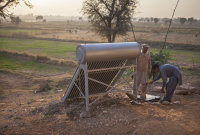Support strong Canadian climate journalism for 2025
The astronomical grocery store prices are sending a clear message: the global food system is crumbling like cookie dough.
In 2022, 6.9 million Canadians were food-insecure, meaning over 18 per cent of Canadians worry about running out of food, being unable to afford food, compromising their nutritional intake and skipping meals. This percentage is a fraction of global food insecurity, which impacted a shocking 29 per cent of the population in 2022.
Climate change is a main driver of our modern food crisis. Droughts and wildfires out West are hurting pollinators and fruit farmers; soaring temperatures in Colombia are reducing farmland for coffee; extreme rainfall is drowning rice crops in China; a catastrophic drought in the Horn of Africa is annihilating entire crops and livestock. As food gets harder to produce, prices, resource-induced conflict and food insecurity will rise.
While climate change is making headlines like never before, the news misses a key component in our food crisis: the violation and suppression of women’s rights within the food system is accelerating our global food crisis. If we want to fix our food system, we need to make it gender-equitable.
Gender inequity: Not a bite-sized challenge
Women have always been leaders in local and regional food systems. This is apparent in Indigenous and pastoralist communities. In addition to serving as home energy and resource managers, women represent 43 per cent to 60 per cent of the global agricultural workforce and produce up to 80 per cent of the food in developing countries.
When the food system is disrupted by climate change, women are disproportionately impacted. For instance, in Southeast Asia, 71 per cent of working women are employed in the food system compared to 46 per cent of working men.
The food system is gendered because structural inequities driven by colonization and industrialization stripped women of their agency. Inequity was amplified by the Green Revolution in the 1960s when patriarchal mega-corporations built their profits on the backs of the socially marginalized.
Today in over 100 countries, women’s land rights are denied. Women sacrifice their nutritional needs to feed their families. Young girls drop out of school more than boys to fetch water.
Outside of farming regions, women are still treated like they are at the bottom of the food chain. Women spend their lives restricting their own food intake or being fed less than their male counterparts in order to meet social expectations that equate femininity to taking up as little space as possible.
With the loss of women’s leadership, our global food system has fractured.
Complex technologies are producing more food faster than ever, yet 2.4 billion people — especially women — could not access sufficient, safe and nutritious food in 2022, and one-third of the food produced was wasted. This fracturing will worsen because these technologies cannot handle the pressures of climate change.
Hungry for change
From field to fork, women are on the front lines of climate change. Yet the policies, mega-corporations and social norms governing the food system are preventing women from leading the global healing process. We cannot feed 10 billion people by the 2050s with this inequitable, dehumanized system that is also responsible for 30 per cent of global greenhouse gas emissions, 50 per cent of habitable land use and 70 per cent of global freshwater withdrawals.
As climate change and food insecurity worsen, so can unemployment, poverty, domestic violence and conflict. There are so many interconnected problems we can solve by making our food system gender-equitable and recognizing women as agents of change.
Their generational knowledge of food, complemented by their determination, adaptability and critical thinking, make them exceptional problem-solvers and community organizers who feed everyone equitably. We are seeing the re-emergence of women as leaders in some localized food systems. This effort must be scaled up through policy to build a resilient global food system.
Canadians and the rest of the developed world must have forgotten or mentally blocked out our pandemic-driven food fear during 2020. That short-lived reality for myself still affects millions around the world.
Today’s skyrocketing food prices are a canary in the coal mine, warning us to reimagine our food system. If we allow the food system to crumble, women will be the worst off, but everyone will struggle.
Women can lead us to a resilient global food system that can adequately feed 10 billion people on our planet and withstand the threats of climate change. At its core, a gender-equitable food system is a healthy, adaptable, climate-resilient food system.
Jenna Phillips (she/her) is a climate communicator who is dedicated to promoting sustainability literacy. She is the founder and host of Clear the Air, an online learning platform that teaches sustainability, dispels climate myths and empowers young people to take climate action.






Comments